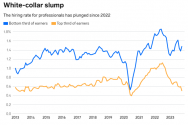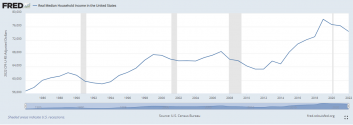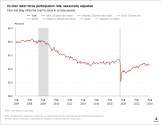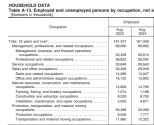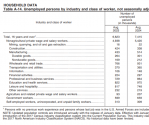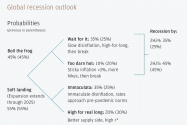All of these concerns were reinforced by Friday's jobs report; As Zero Hedge noted, the report told us that the US lost a staggering 438,000 full-time jobs last month:If five of my web developer Chinese friends in Texas are saying that job market is bad, obviously there is significant bias in my personal annecdote. But when over 100 of them across 10 separate professions, four different ethnicities, both genders, three separate educational levels, 1-20 years of experience level, and eight different states are all saying that the market is bad, I think that it is more likely that some one has been fudging with the data.
If you want a low-paying part-time job, it’s still pretty easy to find one. But high-paying jobs are disappearing fast. The president of a company that finds positions for white-collar workers says the market is in “bad shape” right now:Starting at the top, while the number of employed workers did rise by 168K, looking closer at the composition of this increase is disastrous: that’s because it consisted of an increase of 527K part-time jobs, offset by a 438K plunge in full-time jobs.
This means that since last June, the US has added just over 2 million part-time jobs, and lost over 1.5 million full-time jobs.
I would say “bad form” is an understatement.Economists largely agree that the labor market is “cooling,” but one recruiting industry veteran says that is a significant understatement.
Brian Howard is the founder and president of the Howard Group, a boutique search firm located in Overland Park, Kansas, that has been in business for more than 30 years, which companies hire to recruit candidates in an array of white-collar positions.
He said the job market is in “bad shape.”
I came across an article about a man with an MBA who couldn't find a job despite applying to over 1,500 jobs:
There are a lot of people looking for work right now. For many Americans, low-paying part-time jobs aren’t enough because the cost of living continues to rise. Thanks to the rising cost of living, the percentage of American households with children who are “food insecure” has reached a very alarming level:Marcial Quinones, 48, used to have few problems getting jobs in the 1990s without a high school diploma. Now, after what he estimates is over 1,500 applications since the early 2010s, he can’t land any stable job in his field even with an MBA.
Quinones, a father of four who lives in rural eastern Pennsylvania, said he’s struggled to land a long-term job in tech or counseling. He has held part-time positions and built his own inventory software to sell to companies, though he rarely gets interviews, even after redoing his résumé two dozen times.
In many of these families, at least one adult is actually working. But in many cases there is simply not enough money to cover even basic needs. Right now, American workers have so little disposable income that even dollar stores are really struggling:Now, the inflation crisis under the Biden-Harris administration has intensified this issue even more. It was especially families with that suffered during Covid-19 as school lunches disappeared and they have been hardest hit again in 2022 and 2023.
the USDA just published its on the issue, showing that last year, almost 18 percent of households where children lived were food insecure, up from 17.3 percent in 2022 and 12.5 percent in 2021.
Dollar Tree stocks plunged to a 9-year low earlier this week, after the chain delivered a disappointing earnings report.
Earlier this year, the company announced it would close 600 Family Dollar stores in 2024, after it struggled to integrate the chain into its business.
Dollar General, which is the biggest dollar store in the US and is located mostly in low-income, rural areas, also reported dismal sales last month and saw its stock plummet.

